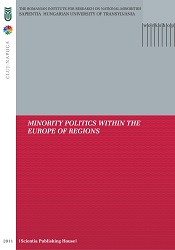Friend, Foe or Simply Indifferent? EU Conditionality in the Field of Minority Protection in the Light of the Demands of Ethnic Minority Parties
Friend, Foe or Simply Indifferent? EU Conditionality in the Field of Minority Protection in the Light of the Demands of Ethnic Minority Parties
Author(s): Edina Szöcsik
Subject(s): Politics / Political Sciences
Published by: Scientia Kiadó
Keywords: EU;Central and Eastern European countries;conditionality;European Commission
Summary/Abstract: Many studies analysed whether and how the EU succeeded to induce a higher level of minority protection in Central and Eastern European countries (CEECs) through the conditionality of the EU membership. The prevalent opinion in the literature is that, in general, the EU conditionality was effective. However, the EU conditionality in the field of minority protection came under criticism due to its lacking EU internal foundations, its inconsistent application, and the lacking transparency of the monitoring process by the European Commission. This paper explores the EU conditionality in the field of minority protection from a new angle. The aim of this paper is to assess in a descriptive manner how the conditions in the field of minority protection of the EU are related to the demands of ethnic minority parties during the accession process. Did EU conditionality support or undermine the demands of ethnic minority parties? This question is highly relevant as ethnic minority parties provide the political representation of national minorities in many cases and are often the most important and legitimate actors pushing for higher levels of minority protection in the domestic area of the CEECs. As an example, the demands of the Hungarian minority party in Romania (UDMR) and the conditions of the EU related to the Hungarian minority are compared based on the content analysis of the most important programmatic documents of the two actors. The results show that the EU backed only the demands of the UDMR in the field of restitution and Hungarian language use but it did neither in the field of education in the Hungarian language nor related to the reform of the public administration.
Book: MINORITY POLITICS WITHIN THE EUROPE OF REGIONS
- Page Range: 277-301
- Page Count: 25
- Publication Year: 2011
- Language: English
- Content File-PDF

